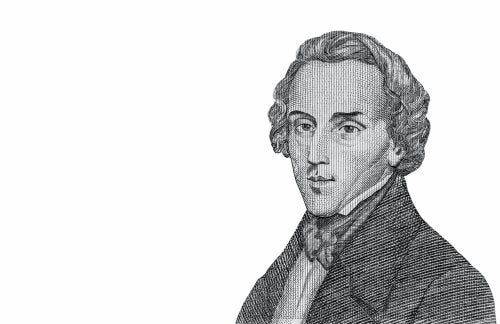Frédéric Chopin, A Biography of the Piano Poet

Frédéric Chopin, also known as the piano poet by his contemporaries, had a contradictory personality that combined two great virtues: he was a talented composer and a sublime interpreter.
Basically, two issues captured his sensitivity: a love for his country and the imprint of the women in his life. The first one marked his work and his thinking to such a degree that, upon his death, surgeons conducted an autopsy to remove his heart and ship it to Poland for its burial.
The piano poet
Chopin had little luck with women throughout most of his life. Perhaps it was due to his personality; he was extremely modest with high moral norms and also rather shy in love. Ironically, he loved social gatherings.
He had a romance with writer George Sand (the pen name of Amantine Lucile Aurore Dupin). However, he felt the lack of love more strongly than the happiness of corresponded love throughout his existence.
Chopin embodies the values of Romanticism, a movement that exalts the conscience of the self, national values, and country. It was an art movement that encompassed everything from literature to music. Every field impregnated by the values of freedom, subjectivism, and originality.

The early years of Frédéric Chopin
He was born in a small town called Żelazowa Wola in 1810, in present-day Poland, although it was part of the Duchy of Greater Warsaw at the time. There’s no certainty about the exact date of his birth but historians think is either one of these two dates: February 22 or March 1.
His father, Mikolaj Chopin, was a literature professor of French descent. His mother, Tekla Justyna Krzyżanowska, came from the upper class but didn’t have financial resources.
Frédéric was the second of four children and the only male. The family moved within a strong cultural environment; literary and musical evenings were one of their main hobbies. Surrounded by the artistic environment, it isn’t surprising that Chopin soon became interested in music.
Historians say that little Frédéric couldn’t hold back his tears when he heard a piano performance during one of these gatherings. Thus, his parents became aware of his musical sensitivity.
Frédéric Chopin started taking piano lessons at a young age and, by the age of ten, he had already written two works: a Polonaise and a Military March. Elsner, the director of the Warsaw conservatory was one of his instructors and spoke highly of his talent. The child began to express his talent under the guidance of this man.
The expansion of his talent
Frédéric Chopin was fond of the popular music of his country. It was the substrate from which he started to create some of his most beautiful compositions. Perhaps this is why there’s a clear nationalist tone from the beginning of his work. This isn’t surprising from Romanticism authors though.
Chopin’s first public performances took place in two charity concerts that featured the presence of the Tsar of Russia at the age of 15. From this moment on, his fondness for courtly life, social gatherings, and good conversation began.
He traveled to Berlin when he was 18 and gave a concert at the Imperial Theater of Vienna one year later. This city was the hub of music at that time. At first, the piano poet didn’t arouse enthusiasm among the Austrians, used to more visceral and forceful composers than Frédéric. However, these trips allowed him to work on friendships that were positive for his career.
Chopin created several of his most famous works during the following years. His greatest dream was to travel to Paris, and he did at the age of 21. There, he found the lifestyle he’d always longed for. However, he didn’t know he’d never return to his beloved homeland.

The piano poet had a special sensitivity
Frédéric was unhappy because he couldn’t find love, according to the correspondence he maintained with some close friends. Firstly, he fell in love with a woman to whom he wasn’t able to confess his feelings.
Later, he started a love relationship with another woman. However, her family separated them because Chopin had contracted tuberculosis. Interestingly, this woman married another man she had a child wild, but both the husband and the child died from this disease.
The piano poet’s great love was the writer George Sand. She was older than him, divorced, had two children, and led a somewhat licentious life. But Frederic Chopin was hopelessly in love with her despite his moralistic scruples. The relationship lasted ten years and was rather stormy but also inspiring for the musician.
Chopin fell into a deep depression after separating from George Sand and his fragile and vulnerable health quickly deteriorated. He died when he was only 39 years old, on October 17, 1849. He’s considered the greatest exponent of musical Romanticism. An author whose musical legacy gets to the human soul and who courageously embraced his culture and nationalism.
All cited sources were thoroughly reviewed by our team to ensure their quality, reliability, currency, and validity. The bibliography of this article was considered reliable and of academic or scientific accuracy.
- Cicero-Sabido, R. (2003). “Sintomatología y creatividad. El caso de Federico Chopin” en Gaceta médica de México, 139(2), 192-196.
This text is provided for informational purposes only and does not replace consultation with a professional. If in doubt, consult your specialist.








